Grapevine and the University of Warwick

Pictured: Local people organised a litter pick as part of their ongoing, wider work with Grapevine. Picture courtesy of Grapevine.
Grapevine and the University of Warwick: A ‘Fresh’ approach to participatory research
Project Collaborators: University of Warwick Researchers, Grapevines Connecting for Good Team and the Ball Hill Environment Group
Project Dates: January 2023 - September 2023
Funding: This project has received funding from the University of Warwick Participatory Research Fund.
Community organisation Grapevine and the University of Warwick have teamed up to enable Ball Hill residents in Coventry to investigate issues around local air pollution. By measuring pollution levels around a local school and high street at different times of day, they hope to gain a better understanding of air quality and to advocate for change through a citizens’ jury. This project blends elements of both participatory research and citizen science, with non-professional scientists in Ball Hill undertaking scientific work with a focus on empowerment, education, and change.
New connections, new conversations, new ideas…
Since Autumn 2022, India Holme, Research and Impact Development Manager, Professor Jackie Hodgson (School of Law), and Institute for Global Sustainable Development (IGSD) Director Elena Korosteleva have been developing a relationship with local charity GrapevineLink opens in a new window and exploring ways of working together.
Sian Lewis (pictured), Grapevine Community Organiser for the Connecting for Good Team explains how towards the end of 2022 the team decided “…to shake up our way of working. We wanted to try our hand at place-based organising and focus our energy onto turning groups of people into constituencies that have the power to make significant change.”
The Connecting for Good team began engaging with the Ball Hill area in StokeLink opens in a new window, Coventry, listening to locals and helping them create teams around emerging themes. Community residents were keen to create a Ball Hill Environment Team focussed on air pollution and learn how to “become citizen scientists in the area, collaborating with schools and the community to raise awareness and think of ways to use data to make change.”
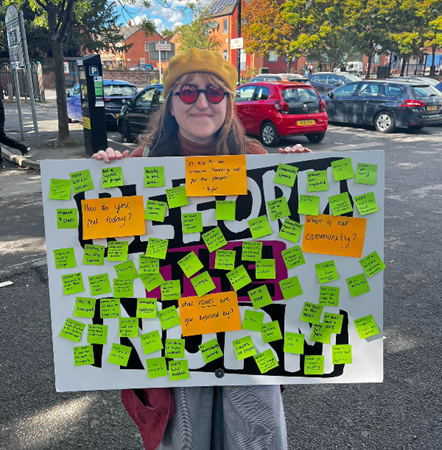
Grapevine works across Coventry and Warwickshire to “help people build power to spark movements for change in their communities.”
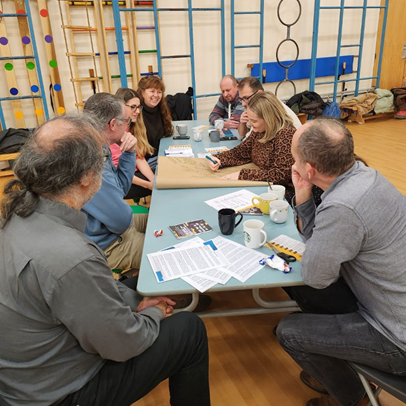
Getting started: Lots of listening, talking and flexibility…
Following a successful application to the University of Warwick Participatory Research Fund, a small core team with members from Grapevine and Warwick was created. The team met first on campus to get to know one another and start to plan a timeline for the project. UoW researchers then attended a Connecting for Good local community meeting with the Ball Hill Environment team to scope out ideas for their Air Pollution Citizen Science project.
This collaborative project has been a remarkable process of mutual knowledge-exchange, flexibility, listening and understanding; having flexed and changed throughout whilst being led by a local community.
As the needs of the project and community aspirations evolved, additional researchers have been brought on board. The team now has 11 members from Grapevine and Warwick alongside various community participants, from residents to school children, teachers, and local businesses. This agile and responsive project has been concurrently developed with the Connecting for Good team ensuring that all decisions have been community-led.
Project Delivery: Organising, collaborating and co-creation…
Between April – July 2023, the Ball Hill Environment Team will receive a series of Warwick-led workshops and equipment to help them prepare to undertake their own Citizen Science project and deliver a Citizen’s Jury.
Listening to the Ball Hill Environment Team, Grapevine and the researchers co-created a workshop schedule. Rosa Fernandez- Martin (Global Sustainable Development, UoW) has delivered workshops on research methods and currently available Coventry air pollution data etc., whilst Elena Korosteleva and Vangelis Pitidis (IGSD, UoW) will share their knowledge around other Citizen Science projects and help the team plan for the Citizens’ Jury.
Eco-Club children at Stoke Park Primary are being trained as Community Organisers by Grapevine and visiting Warwick’s Campus for an air pollution workshop, sustainability tour and lunch run by Lory Barile (Economics).
"Working with Warwick University to introduce research skills to people in Ball Hill is another key way we can help them become advocates and informed spokespeople for the needs of their area." Clare Wightman, Grapevine CEO.
A 'Fresh' approach...
Following multiple discussions between James Covington (Engineering) and community participants, a mix of indoor, personal, and outdoor monitors have been selected to help measure air quality in and around the school and community area.
James’ team at Warwick are creating two high-spec ‘Fresh System’ outdoor monitors from scratch which will be loaned to the Grapevine Ball Hill Environment Team. The indoor and personal monitors will be Grapevine’s to keep.
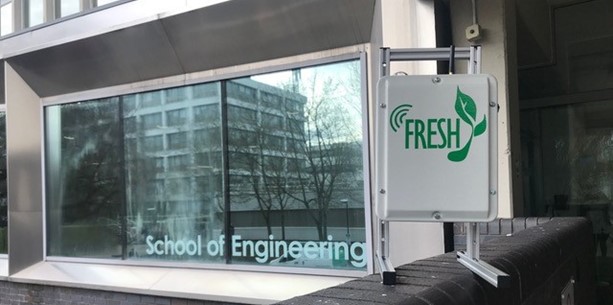
Stoke Primary School Campus Visit
The project team has been keen to involve people of all ages and during July a group of 11, year 5 (age 9-10) Stoke Primary School pupils visited Warwick. The pupils attended with their Headteacher Mat Ashcroft and thoroughly enjoyed the day.
Headteacher Mat was ‘over the moon’ with the visit and the kids’ feedback was really positive, showing that they got a lot our of their visit, learning about air pollution and university life, with many now wanting to go to university to study! This is the youngest group that the Economics Department has had visit, and everyone involved felt it was a great success.
"The range of tasks gave the best insight into seeing how the children think, the questions they ask and their perceptions… it’s been a really good day for the group. Thinking, being challenged and learning new things.” Mat Ashcroft, Headteacher.
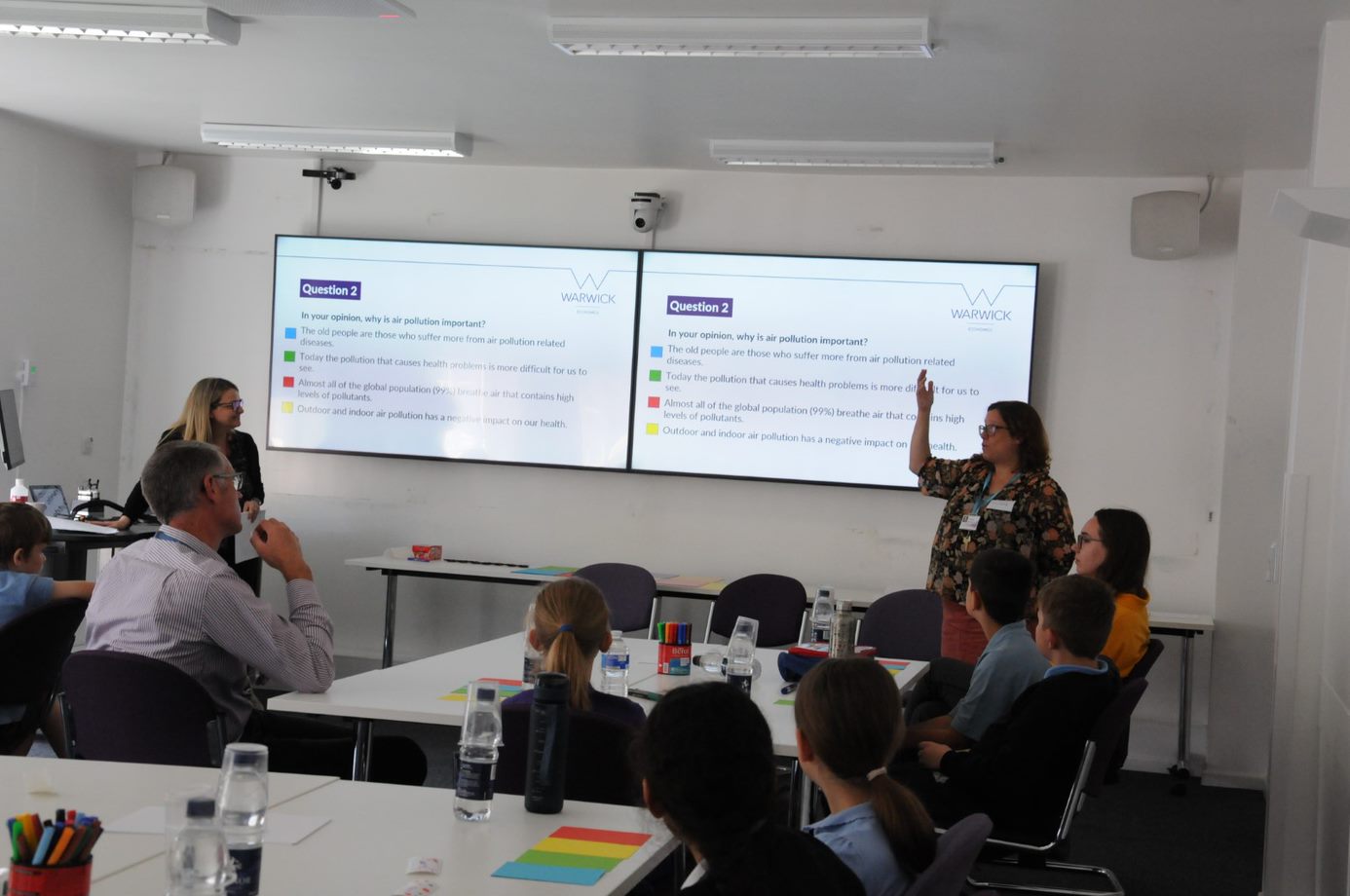
Welcome and Quiz
The guests were welcomed by Dr Lory Barile (Economics), Economics events and widening participation staff and a cohort of Warwick Student Ambassadors. There was a fun interactive air pollution workshop led by Lory, which included a quiz and poster making where they imagined they were local councillors making suggestions to reduce air pollution.
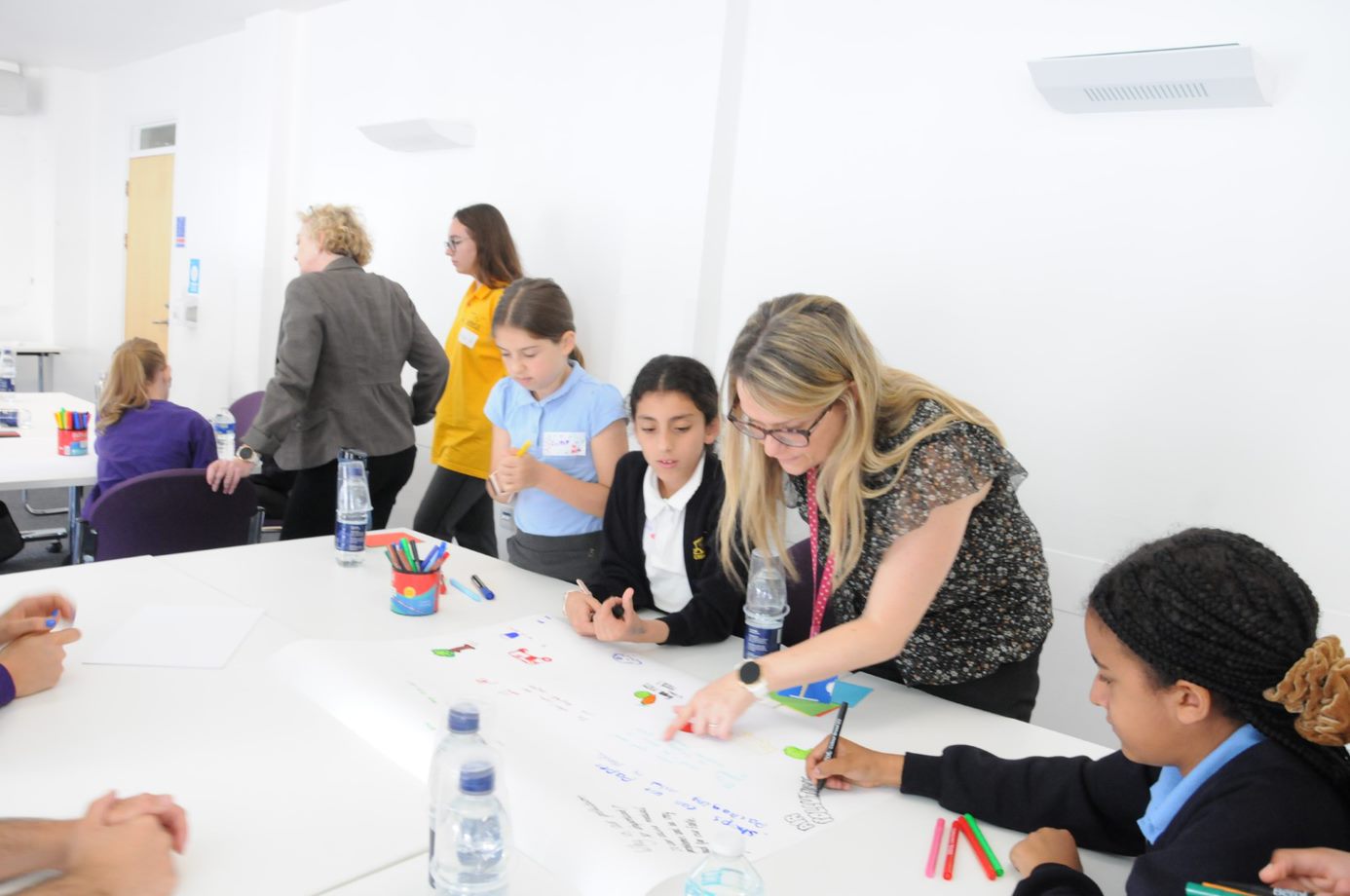
What makes a scientist?
Throughout the day the pupils discussed different aspects of university life, courses and research with the Student Ambassadors. They drew posters of scientists and talked about what makes a scientist.
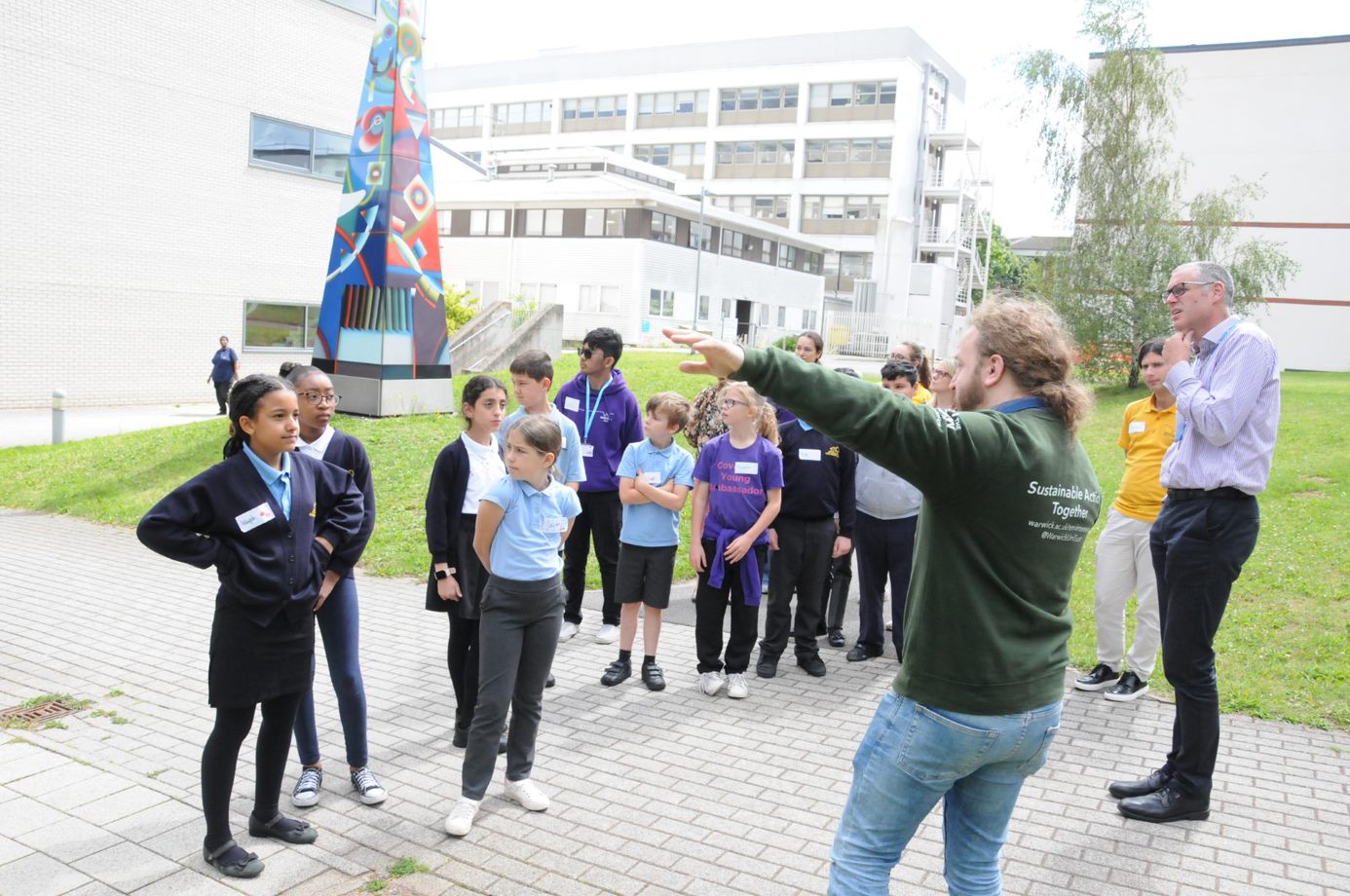
Sustainability Tour
This was followed by a Sustainability Tour of Warwick campus with Sustainability Champion David Chapman, before having a lovely lunch and chatting about their day so far. The day finished reflecting on all they had learnt and making their final posters to capture all their learning.
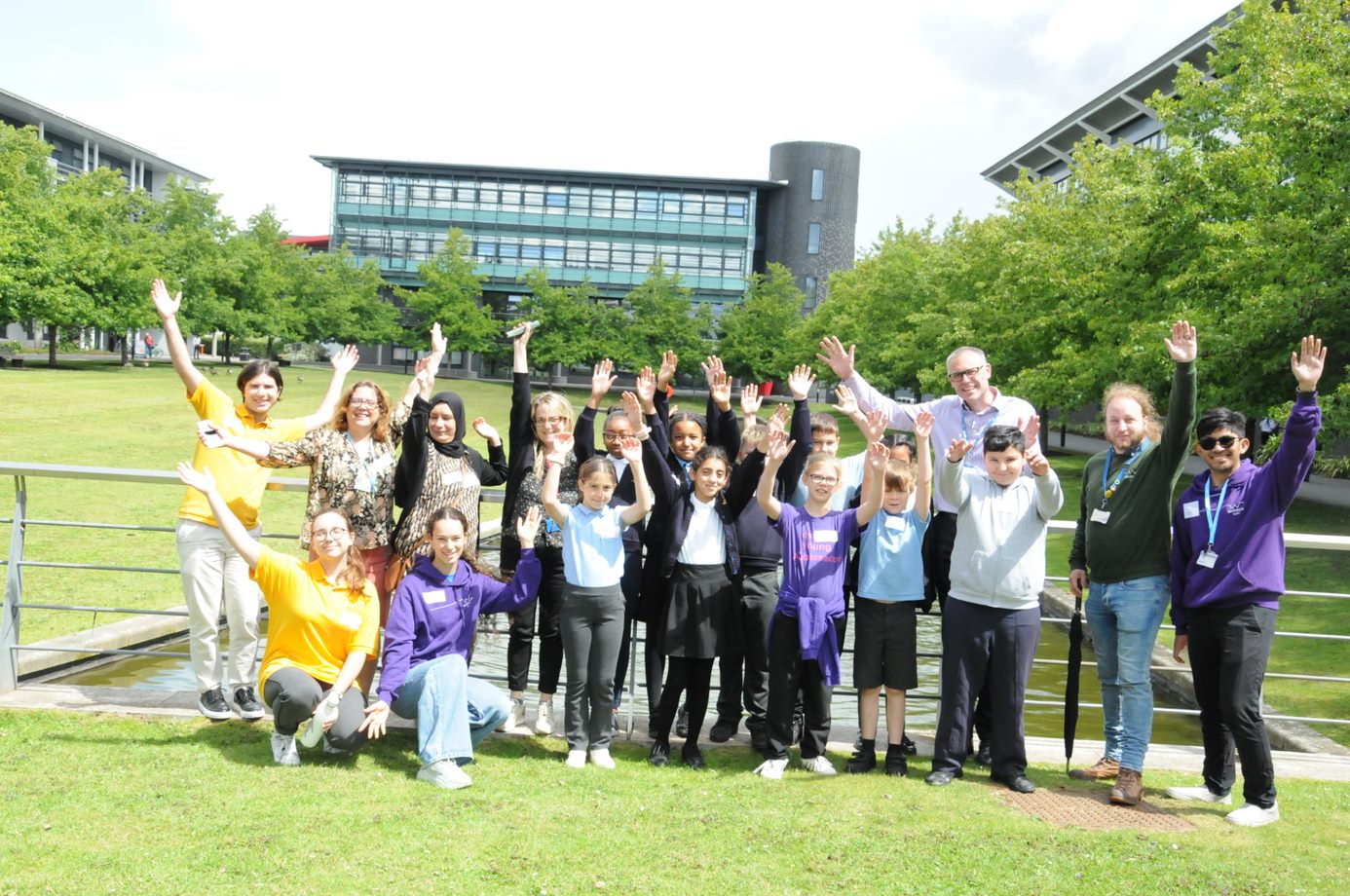
Lots of learning...
The children really enjoyed the sustainability tour and learning about conservation and the interactive air pollution quiz. When asked about what they had learnt that they didn’t know before, pupils said…
“I did not know about nitrogen dioxide.”
“If you stay in a green area for 4-5 minutes it will help your mental health by 75%.”
“I learnt that the most common pollution in Coventry comes from road transport.”
The day really inspired the group, and all reported wanting to know more! More about pollution, conservation, economics, different types of chemicals and invasive species.
When asked if they wanted to study at university, many of the children said “yes!” with one commenting “definitely it was amazing today”.
All the children received gift bags with Warwick merchandise, environment activity books and kits to make their own particulate matter catchers back at school with their classmates. They also took back a selection of environment and air pollution books and their posters to share their learning and undertake research with their peers.
The result? Citizen Led Research and a Citizens Jury on Air Pollution, lots of creativity and a pathway to change via participatory Citizen Science action research…
Citizen Led Research
The Environment team, including the school pupils, were keen to undertake their own research, gathering their own data and disseminating it back to the wider community as part of the Jury and Assembly, thus the team undertook their own citizen science project.
The team designed research questionnaires and gathered qualitative and qualitative data about the wider communities knowledge and concerns regarding air pollution.
The team also utilised data from the the air pollution monitors, comparing it to WHO guidelines on safe levels of pollution.
All the research fed into the Citizen's Jury, where six community members and six expert panel members listened to the teams presentations and provided witness testimony and recommendations.
The process of supporting the community was really targeted and effective. The workshops and guidance from the university gave us confidence in our project, approach, and data. Especially the involvement of Professor James really elevated our project. He and the other researchers drew the line in the sand for the framework as well as our approach in collecting data.
(Mat Ashcroft, Headteacher Stoke Primary School)
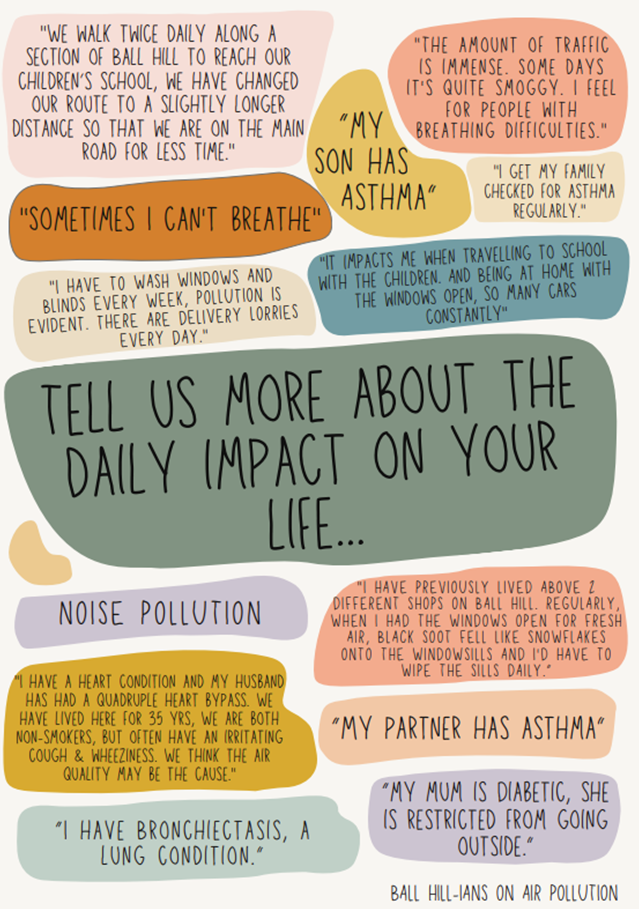
Engaging with Local Policy Makers
During the Jury the Ball Hill Environment Team engaged with the wider community and generated discussions with local policy makers around their research findings, concerns, and the way forward. Expert Jurors included Professor Rashid Gatrad (Professor of Pediatrics and Child Health, OBE DL. PhD DSc FRCP), Lily Makurah (Consultant in Public Health, Health Protection and Sustainable Places), Professor James Covington (Professor in Electronic Engineering & Designer of Fresh Monitors, UoW), John Seddon (Head of Transport and Innovation, Coventry City Council), Emily Stewart (Programme Officer, Health Inequalities in the Built Environment, Coventry City Council), Elspeth Sage (Ecology and Biodiversity Officer, Coventry City Council).
The concept of finding Witnesses and Citizen jurors was exciting. The witnesses were found due to the team’s outreach & connections as well as through support from Council and the University. The team came up with a solid plan to find citizen jurors: large scale surveys, following up on those interested, meeting with them, ensuring representation in terms of ethnicity and age, updating them and securing their continued involvement for the assembly and afterwards as new team members.
Leonie Schmidt, Grapevine Community OrganiserCitizens Jury
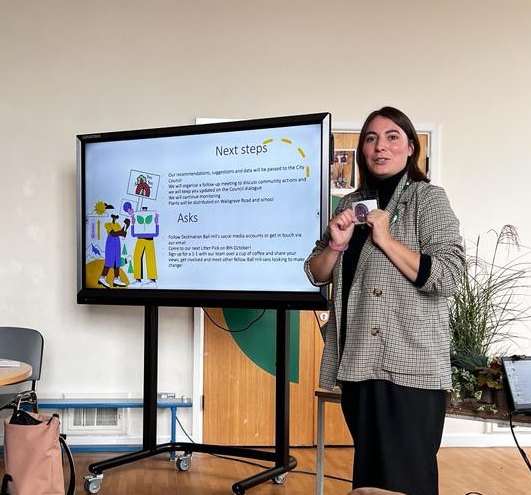
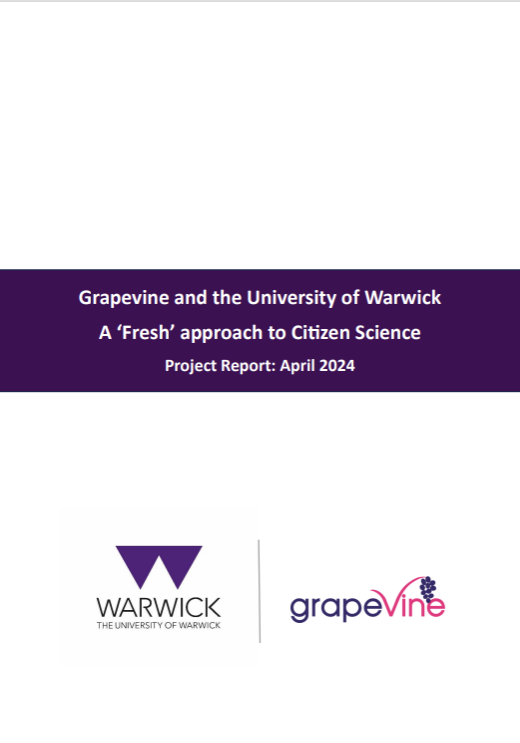
Final Report
A final project is now available and includes the following sections;
1) Co-created and Community Led
2) Citizen Science and Air Pollution Monitoring
3) Stoke Primary School Eco-Club Campus Visit
4) Confidence and Engagement with Local Policy Makers
5) Citizens Jury
6) Citizens Assembly
7) Outputs and Outcomes
8) Challenges
9) Recommendations for Similar Projects
10) Next Steps
11) Project Statistics Summary
12) List of People Involved in the Project
If you would like a copy of the final report, which includes lots of images, quotes, feedback from participants and details about the project then please email india.holme@warwick.ac.uk to receive a free copy.
Quotes from the Final Report
"Working with Warwick University to introduce research skills to people in Ball Hill is another key way we can help them become advocates and informed spokespeople for the needs of their area."
Clare Wightman, (Grapevine, CEO)
" The process of supporting the community was really targeted and effective. The workshops and guidance from the university gave us confidence in our project, approach, and data.
Mat Ascroft, (Stoke Primary School, Headteacher)
Passing the recommendations for the “People powered Green Spaces & Transport Plan for Ball Hill” via show of hands showed people-led democracy in action.
Extract from section 6 of the report.
"We learned a great deal about the science involved in air pollution, both the impact on communities and how data is gathered. The knowledge will be taken forward in the ongoing discussions with the council..."
Jon and Suzanne Gray (Ball Hill Air Pollution Team)

